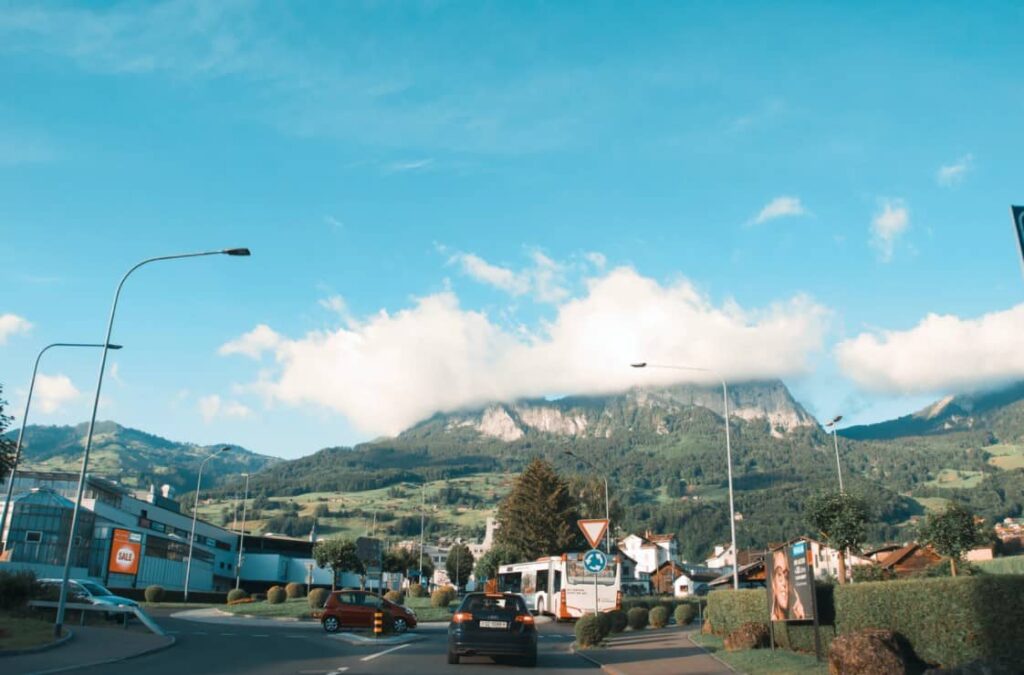Before hitting the road and driving in Switzerland, it’s important to prepare yourself for regulations. You should understand the country’s traffic rules, car registration, and parking and road regulations in the country. Exploring Switzerland by car is one of the most epic ways to experience this stunning country filled with lush nature, picturesque mountain passes, snowcapped peaks, and much more. One thing to keep in mind is that the driving regulations and enforcement are pretty tight, so you want to prepare yourself before hitting the road.
As you may assume, the fines are pretty hefty and that’s the last thing you’d want in Switzerland. In the recent past, Switzerland was awarded the safest roads in Europe by the European transport safety council.
This guide will give you an idea of what to expect when you are going to Switzerland and everything about car importing, vehicle inspections, car registration, speed limits, road rules, renting, parking, traffic reports, and breakdowns, among others.
Driving with a foreign driver’s license
You can legally drive in Switzerland for up to a year using your foreign driver’s license. However, if the license is not in Italian, English, or German, you might need an international driving permit.
The minimum driver’s age in Switzerland is eighteen years, and you should adhere to the rules and regulations set forth by the authorities in the country.
Road tax in Switzerland (Vignette)
Once you enter Switzerland with your own car, first thing you must do: buy a Vignette.
If you are crossing Switzerland border via Autobahn, you will be able to buy Vignette right on the border (the border officers sell it right there and you won’t even be able to get into Switzerland without it).
In some places you can buy Swiss Vignette in bordering countries, especially if you are close to the border, mostly on the last gas stations to the border: in Italy, Germany, Austria or France.
On some smaller borders they sell it in the gas stations. Price is the same everywhere: 40 CHF for one year. If you buy it in January, you can use it till the end of December. If you buy it in the end of December, you can use till the end of December. Vignette is good just for that year you buy it on. If you buy it in July of 2021, it is good just for 2021, not till July of 2022.
It is possible to cross Swiss border in some smaller cities or even mountain roads where there are no gas stations or border officers, so do not worry if you do not have Vignette. You can drive to the closest gas station and get it. Do not enter the highway without Vignette, because you can be stopped and will get a pretty hefty fine which will ruin your holiday or business trip.
Driving a foreign car

If you are a business person or a tourist in Switzerland, you can import and drive your foreign-registered car without paying any duty for two years in Switzerland. Students, employees, or interns who are staying temporarily can import and use foreign-registered cars without paying taxes for up to two years.
However, if you are moving to Switzerland for the long term, you should bring your duty-free car before registering it with the traffic office in your location or canton. You must do in one year time. After that, the whole bunch of taxes will apply for your car: VAT, registration taxes and so on, which can get to a substantial amount of money. If you got your working permit B and you are planning to stay in Switzerland, register your car for free as soon as possible.
Importing a car from abroad
Vehicles that you have owned for less than six months will be charged importation tax. You must provide all the necessary documents for the car to aid in estimating the correct value of the car. The import duty is usually charged at 7.5% of the valued added tax and CHF 15 for vehicle registration and 4% of the total value of the car.
You may also need to get clearance from relevant authorities to aid in your movement from one location to another. Besides, after you have passed the driving test, you will be required to pay for your insurance and license plates.
Car maintenance and registration
It is important to note that each canton has an automobile service that deals with vehicle registration and inspection issues. When you move from one canton to another, you must send your vehicle registration papers and driver’s license for the update.
If you have chosen to move to a different canton, it would be prudent to request a new license for your new canton’s automobile within two weeks of your relocation.
Road taxes

The individual cantons usually charge license plate, and road tax, and the charges may vary from one canton to another. These costs usually depend on the car and this can range anywhere from CHF 100 to 800 and this is billed annually.
If you want to use motorways, there is a special tax sticker you put on your windshield and this is available in custom offices and garages. This is usually valid for one year.
Traffic rules and offenses
It is important to note that you must carry your driving license, red warning triangle, an extra pair of glasses if you wear, and motor insurance if you want to drive in Switzerland. You must understand the rules and regulations of the road in Switzerland because the traffic police are so strict about enforcing them. You can avoid hefty fines on the spot if you can follow the traffic rules in the county.
Here are some basic rules that you must be familiar with:
- Always drive on the right-hand side of the road unless overtaking or you are instructed.
- Vehicles inside the circle have the right of way on a roundabout.
- Priority roads have yellow on the white diamond indication on them.
- The ascending vehicle has the right of way if two vehicles meet on a narrow mountain road.
- Always give way to pedestrians, emergency vehicles, and public transport.
- Always be aware of the speed limit.
- Traffic lights flashing amber outside peak hours indicate that you proceed with caution.
- You must drive with headlights on at all times.
- It is illegal to use mobile phones while driving.
- Alcohol limit is set at 0.05% while driving.
- Always put on a seatbelt and children under 12 years of age must sit in child seats.
p.s. if you’re still not sure which routes to take, I can’t recommend driving along with famous mountain passes. These roads are extremely curvy, surrounded by beautiful landscapes and mountains. It’s such an awesome experience to drive around these passes. Also, you can stop on many places, and take stunning photos.
Road signs
Switzerland has four major languages and the information will change as you move from one part of the country to another. You can use a highway manual code if you are facing challenges when moving from one location to another.
Speed limits depend on the location, with residential areas stuck at 30 km/h, towns and cities 50km/h, motorways 120km/h, and country roads at 80km/h. however, it is imperative to understand that you can get other signs indicating otherwise, and it is prudent that you follow the guidelines of your current canton. There are fixed cameras, speed cameras, and police and the fines will be graded according to how much you are in a certain area.
Parking your car
You must always be careful when it comes to parking and its regulation while in Switzerland. Any violation of the rules may lead you to pay hefty fines that you could have avoided. White zones indicate that you can park your car for free, white zones with a pay and display will have you park at a limited time, for the red zones you have only 15 hours of parking, for blue zones, you will be able to park for 90 minutes free of charge.
Parking is illegal in yellow zones. You will find parking meters in most places, and you should take your time to pay your parking fees before moving or parking your car. Besides, you should change your tires to winter tires if you intend to drive during the winter.
Start your driving trip around Switzerland
Driving in Switzerland is one of the best ways to experience this beautiful country. It’s important to mention that the rules are strict and fines are draconic, but it’s like everywhere in Europe. Also, Switzerland is known as a country with the safest roads in Europe. Even if you’re not planning to import your car, there are many car rental options where you can score awesome deals. Enjoy and have a safe ride.


